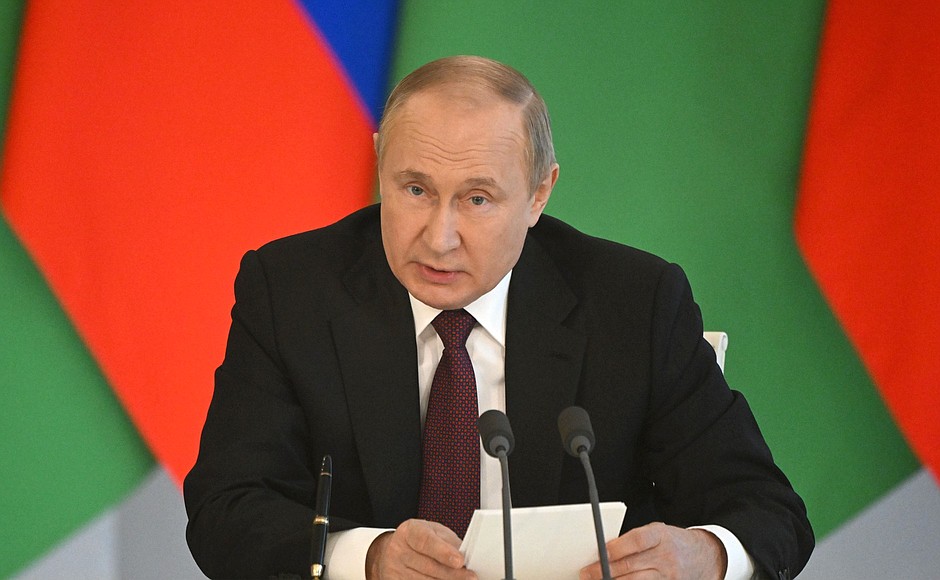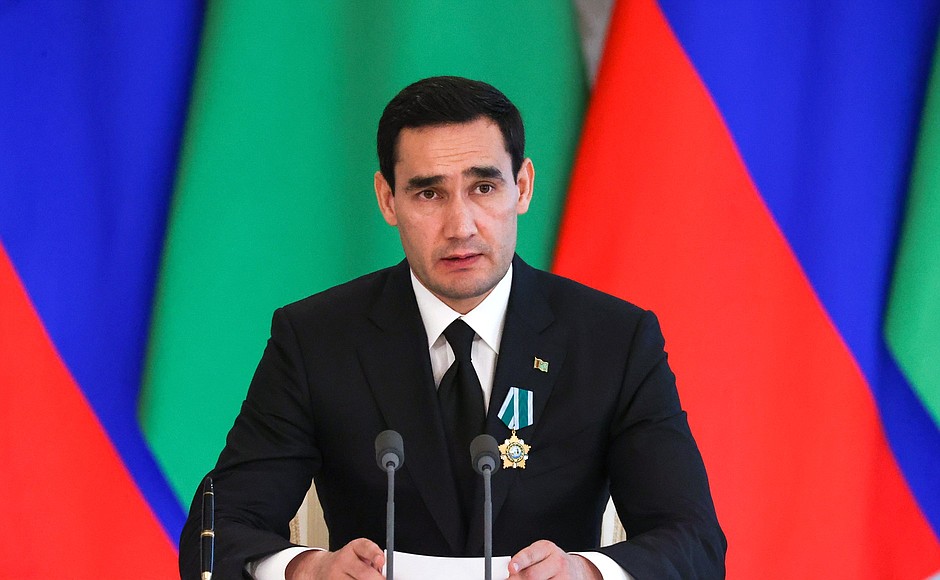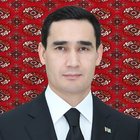President of Russia Vladimir Putin: Ladies and gentlemen, colleagues,
The talks with the President of Turkmenistan were quite substantive and were held in a business-like, friendly atmosphere, underscoring that our mutually beneficial cooperation is a true partnership.
The current year is a noteworthy one for relations between Russia and Turkmenistan. In April, we celebrated 30 years of diplomatic relations and 20 years since the signing of the fundamental bilateral Treaty of Friendship and Cooperation, which is a solid foundation of our multifaceted cooperation.
See also
The Declaration on Deepening the Strategic Partnership that we have just signed sets forth priorities for future political, trade, investment, cultural, humanitarian and security cooperation, including biological and cyber security.
I would like to note that Russia is one of Turkmenistan’s key economic partners. Last year, our trade amounted to US$865 million and in the first quarter of this year, it went up by another 45 percent.
The Russia-Turkmenistan Inter-Governmental Commission on Economic Cooperation is successfully working to diversify trade and investment exchanges and investment opportunities. Its Russian co-chair visited Ashgabat not so long ago to discuss promising joint projects and ways of expanding the use of national currencies in bilateral settlements.
Energy remains a key sector of the bilateral partnership and was the focus of our discussions today. Both sides showed interest in establishing cooperation between Russia and Turkmenistan’s energy agencies and supporting the business community’s initiatives to follow through on current mutually beneficial undertakings.
Notably, Gazprom is cooperating with Turkmengas concern for exports of gas from Turkmenistan under a long-term contract with an option for Russia to buy gas from Turkmenistan.
LUKOIL is negotiating the terms of participation as an operator of the Dostluk oil and gas condensate field development project in the Caspian Sea.
TATNEFT has been successfully engaged in repairs and maintenance of oil wells in Turkmenistan for a long time now. The introduction of the latest Russian technology has led to a significant increase in oil fields’ productivity and more new jobs.
Other major Russian energy and industrial companies, such as Inter RAO and Silovye Mashiny [Power Machines], are interested in carrying out projects in Turkmenistan as well.
We are talking about upgrading existing power plants and building new ones, including the use of renewable energy sources, the construction of high-voltage overhead lines, and electricity transit and export.
During the talks we also touched upon such important topic as the further promotion of industrial cooperation. We noted the successful implementation of a number of major joint projects.
The construction of a multi-purpose dry cargo ship for Turkmenistan by the United Shipbuilding Corporation is one such joint project. Two high-speed passenger ships have already been handed over to Turkmenistan, and plans are in place to build several passenger-and-freight ferry boats.
Russia’s Transmashholding has built two locomotives for Turkmenistan Railways, and a contract for five more was signed in March. KAMAZ has increased its deliveries to Turkmenistan’s market with about 2,000 trucks delivered last year. A new corporate training centre opened in the city of Turkmenbashi.
Both sides expressed willingness to pursue more large-scale initiatives in the construction industry. The Russian company Vozrozhdenie is already successfully operating in Turkmenistan. The President spoke highly of its work. It has built road and transport infrastructure worth over US$1.5 billion over the past 10 years and is now building a mudflow protection system outside Ashgabat. The work is nearing completion.
It is gratifying that Russia and Turkmenistan are working as partners in the fight against the spread of the coronavirus. Last year, Turkmenistan was supplied with 330,000 Sputnik V vaccine kits, and this January 800,000 doses of Sputnik Light, including 300,000 free of charge.
The President of Turkmenistan and I have agreed to further promote comprehensive development of bilateral cultural contacts between our citizens and encourage scientific, educational, cultural and sports exchanges.
We are grateful to the leadership of Turkmenistan for caring about the Russian language and Russian culture. The joint Pushkin Russia-Turkmenistan secondary school in Ashgabat – a leading educational institution in the country with instruction in Russian – has been successfully operating for 20 years, where teaching is carried out according to Russian state educational standards and textbooks. The President expressed his interest in expanding this school, for which I am very grateful. We will support this in every possible way.
By the way, Russia is actively helping Turkmenistan to train highly-skilled personnel in various areas. Russian education is consistently popular among Turkmen youth. Currently over 30,000 students from Turkmenistan are studying in Russia, including over 4,300 with budgetary support. The President raised an idea – a very good idea, and of course we will support it – to establish a joint Russia-Turkmenistan university.
Of course, during the talks we also discussed the most pressing regional and international problems. Our states’ positions on most of them are traditionally close or the same.
I would like to stress that Russia respects the neutral status of Turkmenistan and its leadership’s ambition to promote stable and sustainable development in the Central Asian region and the world in general.
Based on this, we will continue to cooperate at multilateral platforms. We are grateful to our Turkmenistani partners for their consistent support of many Russian initiatives at the United Nations, including those directed against attempts to glorify Nazism and falsify history.
We welcome the growing interest of our Turkmenistani colleagues in the ongoing integration processes at the Eurasian Economic Union and the Shanghai Cooperation Organisation. Turkmenistan has close trade and economic relations with EAEU and SCO members.
Moscow and Ashgabat are cooperating closely within the CIS. The Central Asian Five plus Russia is a promising cooperation format as well.
Mr Berdimuhamedov and I discussed in detail ways to strengthen cooperation in the Caspian Sea region. Russia and Turkmenistan believe that working as a team with the Caspian states in matters of ensuring security, deepening economic partnership, preserving natural resources and maintaining ecological well-being is highly important. Preparations for the Sixth Caspian Summit in Ashgabat and the Second Caspian Economic Forum in Moscow are underway.
When exchanging views on the situation in Afghanistan, both sides noted the importance of ensuring stability and security in that country, resolving pressing socioeconomic issues and neutralising threats, primarily terrorism, emanating from Afghan territory.
We are ready to continue to work together with Turkmenistan and our other partners, including as part of the Moscow format of consultations – Russia, India, Iran, the United States, China, Pakistan and the five Central Asian republics – on the post-conflict rebuilding of Afghanistan, and to help that country integrate into regional infrastructure and supply chain projects.
However, we firmly believe that the United States and its allies, whose 20-year presence in that country has brought it to a critical state, should assume the bulk of obligations, primarily financial, to rebuild Afghanistan.
I asked our guest to convey our warmest greetings and wishes of good health and success to Gurbanguly Berdimuhamedov. Over many years of working together, we have developed truly friendly, comradely relations. As the President of Turkmenistan and now as the head of the upper house of the country's parliament, he has always contributed to promoting partner-like and mutually beneficial Russia-Turkmenistan cooperation.
In conclusion, I would like to express confidence that today's talks will further strengthen Russia-Turkmenistan relations for the benefit of our two friendly, fraternal nations.
Thank you very much for the attention.
President of Turkmenistan Serdar Berdimuhamedov: Ladies and gentlemen,
During our current visit, we discussed with the President the state and prospects of bilateral cooperation. Speaking about our bilateral ties, I would like to emphasise that they are on the upswing and are developing dynamically and consistently.
Owing to our joint efforts, relations between Turkmenistan and the Russian Federation are on an upward trend. They are distinguished by equality, mutual respect, openness, trust and mutual understanding of the importance of further strengthening friendship and cooperation between our two nations and peoples.
Our state has sufficient potential to increase trade and investment and implement joint projects in industry, transport energy and agriculture, to name a few.
In recent time, we have noticeably stepped up our cultural, scientific, humanitarian and educational ties. Both states are doing all they can to support these processes and are creating the necessary conditions for meeting the growing mutual interest in the history, culture and arts of both countries. They are encouraging broad contacts in these areas.
Turkmenistan and the Russian Federation provided a brilliant example of solidarity during the coronavirus pandemic. We are grateful to the leadership of the Russian Federation for promptly responding to our inquiry about supplies of the vaccine, medications and medical equipment and support for citizens of Turkmenistan who happened to be in Russia in this difficult period.
We signed a package of bilateral documents on current areas of cooperation. I am convinced that this meeting will give a major boost to our strategic partnership, creating new opportunities for promoting political, trade, economic, cultural and humanitarian ties.
Ladies and gentlemen,
Turkmenistan and the Russian Federation will continue close bilateral and multilateral cooperation in the Caspian Sea. We highly value Russia’s participation in Caspian summits and its contribution to achieving key agreements.
We agreed to continue our political and diplomatic dialogue, the main goal of which is to help ensure regional and global security and stability.
I am convinced that this visit has confirmed the durability of the strategic partnership between Turkmenistan and the Russian Federation. I have invited the President of Russia to pay an official visit to Turkmenistan at his convenience.
I would like to use this opportunity to thank Mr President once again for his tireless attention and a tremendous personal contribution to the promotion of bilateral ties.
Thank you for your attention.


